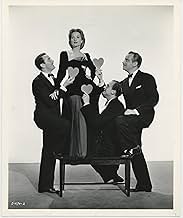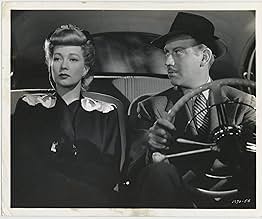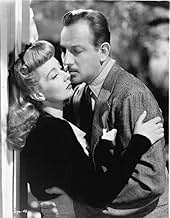Füge eine Handlung in deiner Sprache hinzuWorld War II home front romantic comedy in which a war correspondent's wife wants a divorce along with his help in choosing her next husband.World War II home front romantic comedy in which a war correspondent's wife wants a divorce along with his help in choosing her next husband.World War II home front romantic comedy in which a war correspondent's wife wants a divorce along with his help in choosing her next husband.
Ernie Alexander
- Daily Globe Staff Member
- (Nicht genannt)
Elvia Allman
- Eva
- (Nicht genannt)
Hooper Atchley
- Reporter at Army Concert Hall
- (Nicht genannt)
King Baggot
- Daily Globe Staff Member
- (Nicht genannt)
Arthur Belasco
- Reporter
- (Nicht genannt)
Mary Benoit
- Musician
- (Nicht genannt)
Rudolph Cameron
- Reporter
- (Nicht genannt)
Chester Clute
- Man with Binoculars
- (Nicht genannt)
Phyllis Cook
- Western Union Girl
- (Nicht genannt)
Nell Craig
- Maid
- (Nicht genannt)
Empfohlene Bewertungen
"Three Hearts For Julia" (1943) is another World War II on the home front romantic comedy. Melvyn Douglas plays Jeff Seabrook, a war correspondent in the process of getting a divorce from his wife Julia (Ann Sothern). Jeff does not want the divorce but his wife, a talented violinist, wants a more high-toned (excuse the pun) husband. She has two acceptable suitors and wants Jeff (who she considers her best friend) to help her to decide between them. David Torrance (Lee Bowman), an orchestra producer and Philip Barrows (Richard Ainley), a music critic.
Meanwhile Julia gets fatherly advice from her conductor Anton Ottoway (Felix Bressart) who has become good friends with Jeff.
Jeff's world is represented by the song "Working On the Railroad" and is contrasted with the highbrow numbers she performs in the orchestra. The ending is very predictable.
"Three Hearts For Julia" is a pleasant enough romance but is short on comedy. Douglas and Bressart have one especially good scene where the newsman demonstrates an American folk music instrument called an Indiana Harpsichord to the famous conductor.
There is nothing wrong with the pairing of Douglas and Sothern, they have some chemistry but they are miscast in these roles. To work as a comedy their personalities should have been reversed with Sothern doing her standard "Maisie" shtick and Douglas playing the snob. Julia is just too straight for Sothern to inject any humor into the story and Douglas is only funny when his character becomes exasperated.
"Three Hearts for Julia" is interesting from a sociology standpoint. Julia plays the violin in a newly formed all-female orchestra, reflecting the wartime changes that occurred for women on the home front. Rather than celebrate these changes the film uses them for most of its attempts at humor. For example, the entire female orchestra panics when a mouse appears under one of the footlights and the conductor become angry with the women for checking their makeup and having to care for their children. Apparently the target audience was a reactionary element who yearned for the good old days of traditional homemaking. The ending (despite film's all-time sappiest look from Douglas) hints that Julia has gotten too uppity and would be much happier as the traditional wife of a regular guy.
Then again, what do I know? I'm only a child.
Meanwhile Julia gets fatherly advice from her conductor Anton Ottoway (Felix Bressart) who has become good friends with Jeff.
Jeff's world is represented by the song "Working On the Railroad" and is contrasted with the highbrow numbers she performs in the orchestra. The ending is very predictable.
"Three Hearts For Julia" is a pleasant enough romance but is short on comedy. Douglas and Bressart have one especially good scene where the newsman demonstrates an American folk music instrument called an Indiana Harpsichord to the famous conductor.
There is nothing wrong with the pairing of Douglas and Sothern, they have some chemistry but they are miscast in these roles. To work as a comedy their personalities should have been reversed with Sothern doing her standard "Maisie" shtick and Douglas playing the snob. Julia is just too straight for Sothern to inject any humor into the story and Douglas is only funny when his character becomes exasperated.
"Three Hearts for Julia" is interesting from a sociology standpoint. Julia plays the violin in a newly formed all-female orchestra, reflecting the wartime changes that occurred for women on the home front. Rather than celebrate these changes the film uses them for most of its attempts at humor. For example, the entire female orchestra panics when a mouse appears under one of the footlights and the conductor become angry with the women for checking their makeup and having to care for their children. Apparently the target audience was a reactionary element who yearned for the good old days of traditional homemaking. The ending (despite film's all-time sappiest look from Douglas) hints that Julia has gotten too uppity and would be much happier as the traditional wife of a regular guy.
Then again, what do I know? I'm only a child.
Based on a preview of the cast, I eagerly anticipated this movie, which I had not seen before. I really love films from the '30's to the late '40's. But this movie was a big disappointment. However, I do not fault the cast. Melvyn Douglas is among my all-time faves, and I also like Ann Sothern very much. The problem is not with the actors, but with their characters.
The writer doesn't provide sympathetic characters from the outset of the movie. Douglas apparently abandons his wife frequently and for long periods to pursue his writing career. At the beginning of the movie he is returning home, although he doesn't seem sincere about trying to reconstruct his marriage. He seems like he is coming home for another respite (and to placate his wife) before taking off again.
Ann Sothern, the abandoned wife, never really establishes herself as the wronged woman. She has re-launched her career, hooked 2 new suitors and seems set to begin her new life. She doesn't seem to be very emotionally accessible to any of the 3 men in her life OR to us, the audience. Why should we care if this estranged couple gets back together?
Even Felix Bressart, another favorite character actor, is not good here. He seems more goofy than eccentric. His acting is quite a comedic contrast to the remainder of the rather understated performances. It seems a little out of place here.
The humor, as one commentator has noted, is not only predictable, but also based on sexual stereotypes, which I suspect were no more humorous in the day of Rosie the Riveter than they are today. Its only real purpose is to allow Bressart to reflect on how much better his problems are in America than they would be in Europe. The tragic truth in those observations deprives them of much humor.
Despite the unflattering stereotypes, I felt very ambivalent toward the female orchestra members. They are not particularly entertaining or sympathetic. Spending a night at Sothern's house, they all seem to forget they are actually guests in a home that is Douglas' too.
I found myself gradually warming to the characters of Douglas and Sothern. But for a movie to be really engaging, I need to connect with characters early in a film, not gradually begin to warm to them when the movie is half over. That was the real killer for this movie. The predictability and the trite sexism were just additional nails in the coffin. What a disappointment!
The writer doesn't provide sympathetic characters from the outset of the movie. Douglas apparently abandons his wife frequently and for long periods to pursue his writing career. At the beginning of the movie he is returning home, although he doesn't seem sincere about trying to reconstruct his marriage. He seems like he is coming home for another respite (and to placate his wife) before taking off again.
Ann Sothern, the abandoned wife, never really establishes herself as the wronged woman. She has re-launched her career, hooked 2 new suitors and seems set to begin her new life. She doesn't seem to be very emotionally accessible to any of the 3 men in her life OR to us, the audience. Why should we care if this estranged couple gets back together?
Even Felix Bressart, another favorite character actor, is not good here. He seems more goofy than eccentric. His acting is quite a comedic contrast to the remainder of the rather understated performances. It seems a little out of place here.
The humor, as one commentator has noted, is not only predictable, but also based on sexual stereotypes, which I suspect were no more humorous in the day of Rosie the Riveter than they are today. Its only real purpose is to allow Bressart to reflect on how much better his problems are in America than they would be in Europe. The tragic truth in those observations deprives them of much humor.
Despite the unflattering stereotypes, I felt very ambivalent toward the female orchestra members. They are not particularly entertaining or sympathetic. Spending a night at Sothern's house, they all seem to forget they are actually guests in a home that is Douglas' too.
I found myself gradually warming to the characters of Douglas and Sothern. But for a movie to be really engaging, I need to connect with characters early in a film, not gradually begin to warm to them when the movie is half over. That was the real killer for this movie. The predictability and the trite sexism were just additional nails in the coffin. What a disappointment!
Did you love the 1940 comedy Third Finger, Left Hand? Are you looking for something extremely similar to watch on a rainy afternoon? Look no further than Three Hearts for Julia, another romantic comedy starring Melvyn Douglas, and backed by Lee Bowman and Felix Bressart. In this one, Mel makes a surprise entrance upon his female companion, who is an ardent career woman, and has to compete against Lee, who's been making headway during his absence, and ultimately receives some sage advice from Felix, the funny foreigner who's wiser than he seems. Sound familiar? There are very few differences between the two movies, so it's a sure bet if you liked one, you'll like the other.
In place of Myrna Loy, Ann Sothern is Mel's abandoned wife, who's focused on her career as a violinist in an orchestra while he's been an overseas war reporter. Lee Bowman is given just as little character development as before, but merely serves as a rival suitor. Felix plays a Hungarian conductor, brought in as a special guest, who ends up giving marital advice to both Ann and Mel. While I love his hidden talents brought forth in many of his movies, Felix shows off his musical skills in Three Hearts for Julia. A doctor, multilingual, a dramatic and comedic actor, and now a musician! Most of the orchestral scenes show Felix up close, and he nails his conducting in every shot.
If you like Mel's comic timing, Ann's charming insecurity, or movies that feature large swatches of classical music, rent this one. It's pretty good, and no one knows about it so you can be the first to spread it around to your friends.
In place of Myrna Loy, Ann Sothern is Mel's abandoned wife, who's focused on her career as a violinist in an orchestra while he's been an overseas war reporter. Lee Bowman is given just as little character development as before, but merely serves as a rival suitor. Felix plays a Hungarian conductor, brought in as a special guest, who ends up giving marital advice to both Ann and Mel. While I love his hidden talents brought forth in many of his movies, Felix shows off his musical skills in Three Hearts for Julia. A doctor, multilingual, a dramatic and comedic actor, and now a musician! Most of the orchestral scenes show Felix up close, and he nails his conducting in every shot.
If you like Mel's comic timing, Ann's charming insecurity, or movies that feature large swatches of classical music, rent this one. It's pretty good, and no one knows about it so you can be the first to spread it around to your friends.
"Three Hearts For Julia" is another World War II romantic comedy at home. Jeff Seabrook is a war correspondent who is currently divorcing his wife. His wife, a talented violinist, wants a more sophisticated husband. He has two acceptable suitors and wants Jeff (whom he considers his best friend) to help him decide between them. David Torrance - orchestra producer and Philip Barrows - music critic. Meanwhile, Julia gets paternal advice from her conductor, Anton Ottoway, who has become good friends with Jeff.
"Three Hearts for Julia" from 1943 was intended, I believe, to be a screwball comedy. It isn't. It isn't really a light comedy, either, as it's kind of heavy-handed for such a fluffy script.
It stars people who normally could pull off anything: Melvyn Douglas, Ann Sothern, Felix Bressart, Lee Bowman, and Reginald Owen. But you need a stronger script and a director with a flare for comedy.
This is a WW II story about a war correspondent, Jeff (Douglas) who is home at last, only to find his wife (Sothern) wants a divorce. She is a talented musician who is in a woman's orchestra and wants more out of life. He's away too much and preoccupied with his work.
She has two suitors who can't wait for her to be divorced. One is David Torrance, the orchestra's producer (Bowman), and Philip Barrows (Ainley), a music critic. Because she values his opinion, she asks Jeff to help her choose. Jeff has chosen - himself! Some mild humor and good music with one faux pas. The orchestra plays Wagner which during WWII in this country was verboten. So verboten that no Wagner was performed at the Metropolitan Opera and his music was removed from operatic aria compilations. Highly doubtful a European conductor (Felix Bressart) who was glad to be alive would have conducted it.
On the dull side, with good performances, but ultimately a disappointment.
It stars people who normally could pull off anything: Melvyn Douglas, Ann Sothern, Felix Bressart, Lee Bowman, and Reginald Owen. But you need a stronger script and a director with a flare for comedy.
This is a WW II story about a war correspondent, Jeff (Douglas) who is home at last, only to find his wife (Sothern) wants a divorce. She is a talented musician who is in a woman's orchestra and wants more out of life. He's away too much and preoccupied with his work.
She has two suitors who can't wait for her to be divorced. One is David Torrance, the orchestra's producer (Bowman), and Philip Barrows (Ainley), a music critic. Because she values his opinion, she asks Jeff to help her choose. Jeff has chosen - himself! Some mild humor and good music with one faux pas. The orchestra plays Wagner which during WWII in this country was verboten. So verboten that no Wagner was performed at the Metropolitan Opera and his music was removed from operatic aria compilations. Highly doubtful a European conductor (Felix Bressart) who was glad to be alive would have conducted it.
On the dull side, with good performances, but ultimately a disappointment.
Wusstest du schon
- WissenswertesJoan Crawford was offered the lead role, but turned it down.
- PatzerMelvyn Douglas is shown playing a musical saw by kind of strumming it or rubbing it with his bare hand. People actually play a saw by bowing it with a violin bow.
Top-Auswahl
Melde dich zum Bewerten an und greife auf die Watchlist für personalisierte Empfehlungen zu.
Details
- Erscheinungsdatum
- Herkunftsland
- Sprache
- Auch bekannt als
- Tre man om Julia
- Drehorte
- Produktionsfirma
- Weitere beteiligte Unternehmen bei IMDbPro anzeigen
- Laufzeit1 Stunde 23 Minuten
- Farbe
- Seitenverhältnis
- 1.37 : 1
Zu dieser Seite beitragen
Bearbeitung vorschlagen oder fehlenden Inhalt hinzufügen

Oberste Lücke
By what name was Three Hearts for Julia (1943) officially released in India in English?
Antwort

































